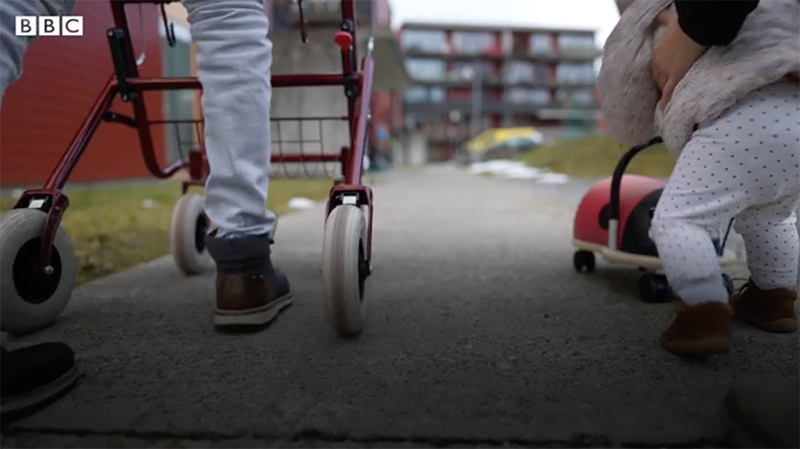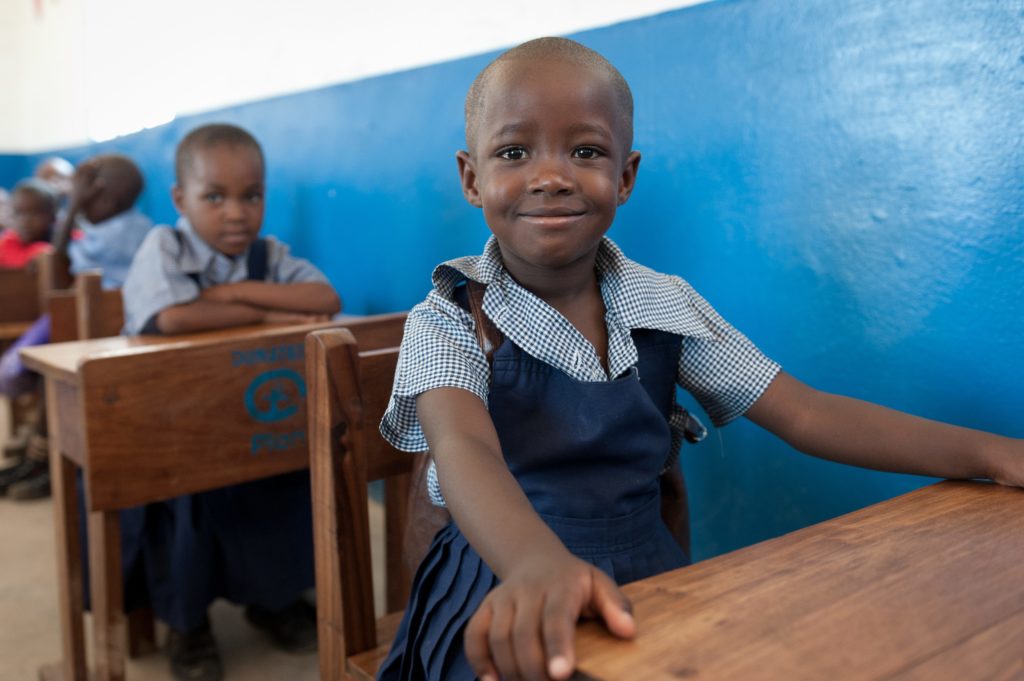Volcanoes are erupting in The Philippines, but on-fire Australia received some welcome rain. The Iran war cries have been called off and The Donald’s military powers are about to be hamstrung by the Senate. Meanwhile, his impeachment trial is starting, and we’re all on Twitter for a front-row seat.
What Could Go Right? The paralyzed, walking again
Covid-19 antibodies from infection last for years, Tanzania ends their ban on pregnant girls attending school, and more
This is our weekly newsletter, What Could Go Right? Sign up here to receive it in your inbox every Thursday at 6am ET. You can read past issues here.
Implants: the paralyzed can walk again, the blind see
An electrical spinal implant has helped nine people walk again, including, for the first time, one with a completely severed spine.
Usually the spine sends signals from the brain to the legs, telling them to move. But when there is a spinal cord injury, the signals are too weak for the legs to pick up on. What the implant does is strengthen the signals so the legs can hear them once more. In the case of the man whose spine was fully cut, since the spine cannot send signals at all, the implant picks up its work fully and sends signals to the legs on its own.
The Swiss developers of the implant stressed that the technology is not a cure, and clinical trials with more people are needed to see if the device will work across a range of bodies. So far the nine who have the implant mainly use it to practice walking, which often “restores a little bit of movement.” The man with the full spinal cut, Michel Roccati, can stand for almost two hours and goes for daily walks using the combination of the implant, which he controls with a tablet, and a walker. (The researchers hope one day the tablet could be switched out for a phone or a wearable like an Apple Watch.) Another, David M’zee, was able to have a child with his partner because of the implant.

Over in Tel Aviv, an Israeli team has created spinal implants made from human cells that allowed laboratory mice to walk again 80% of the time. Because the implants use tissue samples from patients, the scientists are hoping to soon make “personalized implants . . . without risk of rejection by the body” that could be closer to a true cure for paralysis in humans. Clinical trials with people are next.
Bless this 88-year-old woman—who says she would like to get back to her hobbies of gardening and painting watercolors—now that a microchip implanted in her retina may allow her blind left eye to see again. She is the first person to receive the microchip, which works along with special glasses and a small, wearable computer to help patients with dry age-related macular degeneration, in which retina cells degrade and can cause vision loss. It’s too early to tell how successful the chip will be for her and others, but sight restoration is possible.
And a non-implant bonus: after surgery, internal injuries are sealed by stitches, an imperfect method that allows for bacteria leaks that can become infectious. Researchers at the Massachusetts Institute of Technology (MIT) have developed a replacement, a dressing that sticks on the inside but not the outside, like tape. It is flexible—meaning that it can contour to something like an intestine—degradable, transparent, and once applied, forms a gel that speeds healing. It has worked well in rats and pigs. What now? You guessed it: human clinical trials.
Tanzania ends ban of pregnant girls in schools
Tanzania’s first female president, Samia Suluhu Hassan, has put a stop to the country’s decades-long policy of tossing pregnant girls out of school and banning their return, writes Serjevah Davis for The Progress Network (TPN) this week.
Former president John P. Magufuli doubled down on the rule in 2017. “We cannot allow this immoral behavior,” he said, referring to teen pregnancy, “to permeate our primary and secondary schools.” His statements resulted in reports of school officials conducting surprise pregnancy tests to root out pregnant students.
This policy reflects a particularly brutal issue in Tanzania, where many families cannot afford the fees associated with attending school, such as uniforms, supplies, and food. It is not uncommon for men to prey on girls walking to school, offering to pay their fees in exchange for sex.
With its reversal of the ban, Tanzania becomes the penultimate African nation to end legal expulsion of pregnant girls from school, after Sierra Leone in 2020 but before Equatorial Guinea, the last holdout on the continent.
Progress grab bag
Everything with time. Remember when studies were coming out that our antibodies after Covid-19 infection drop precipitously? That’s still true, but now we know, with the benefit of several longer-term studies, that they drop and then stabilize at high enough levels to prevent severe illness upon reinfection. If you’re under 50, without underlying health conditions, and previously had Covid, you may get ill again, but more mildly. Add a triple-vax to that, and you are very likely golden.
Researchers at MIT just made a plastic that is two times stronger than steel, can conduct electricity, and block gas. Wait, you say, aren’t we supposed to be moving away from plastic? This one could mean using “less plastic for some of the same products,” and may be recyclable to boot—they don’t know yet. “I could see,” writes Mark Wilson in Fast Company, “two simultaneous futures for the plastic industry. In one lane, we have super strong plastics . . . for permanent uses like buildings, that can outperform materials like steel while reducing their carbon footprint. In the other lane, we have other types of naturally sourced ultra-compostable plastics, which we can throw away without the guilt.”
The opening lines of this Associated Press article say it all: “Without much fuss and even less public attention, the nation’s egg producers are in the midst of a multibillion-dollar shift to cage-free eggs that is dramatically changing the lives of millions of hens in response to new laws and demand from restaurant chains.” In 2010, 4% of American hens were in cage-free housing. In 2020, 28% were, and that figure is expected to grow to 70% by 2026.
Canada definitely started a trend. Conversion therapy under the age of 18 is now illegal in New Zealand.
Before we go
Is the “misinformation problem” misinformation? TPN Member Matthew Yglesias with an interesting case for that here, and TPN Member Tyler Cowen questions whether there was ever a golden age of accurate information here. (By the way, Yglesias’ recent “People Need to Hear the Good News about Climate Change” is also good. Find it below under TPN Member Originals.)
Correction: Last week’s newsletter identified Lindsey Graham as a North Carolina Senator. He serves in South Carolina. Our apologies for the error.
Below in the links section, sharks get protections in Hawaii, Canadian physicians get the go-ahead to prescribe free nature passes, Scotland aims to plant a million trees for the sake of the salmon, and more.
Tanzania Ends Ban of Pregnant Girls in Schools

In doing so, it becomes the penultimate African nation to allow girls, often coerced into pregnancy, to continue their education. | Read more
Bonus Podcast Episode: Bridging Our Divides

The United States is a country divided, characterized by collapsing levels of trust in our institutions, in our politics, and in each other. How did we get into this mess, and how do we get out? Join The Progress Network for a conversation with TPN Members David Brooks and Theodore R. Johnson, hosted by our founder, Zachary Karabell, centered around this question. This conversation was recorded on December 21st, 2020. | Listen to the episode
Progress, Please
(Found good news? Tweet at us @progressntwrk or email.)
Other good stuff in the news
United States:
- North Carolina no longer requires a doctor’s prescription for birth control | The 19th
- The FDA authorized a new Covid antibody drug to fight Omicron | NBC News
- How to reclaim normal life in the next phase of the pandemic without being ‘done’ | The Atlantic
- States are getting the go-ahead to build electric car charging stations | AP
- Hawaii became the first US state to ban shark fishing | The Optimist Daily
- The US Army has a plan to hit net-zero carbon emissions | E&E News
- An open-source DIY heater helps the unsheltered stay warm in winter—and it costs only $7 | Freethink
- A new study strengthens evidence that Covid-vaccinated pregnant women pass strong protection to their children | WSJ
- The flooded remains of coal mines could heat homes of the future | CNBC
- A first-in-the-nation project will cover canals with solar panel canopies | The Hill
- The country’s first neighborhood microgrid is coming online in Chicago | Canary Media
- A woman has been cured of HIV using a novel treatment | NYT
International:
- How one of the world’s biggest carbon emitters got a factory to zero emissions | WSJ
- A promising immunity-boosting breast cancer drug could save thousands | The Guardian
- Scientists made a major breakthrough on nuclear fusion energy | BBC
- The search for lost slave ships led this diver on an extraordinary journey | National Geographic
- In Rwanda, Hutu and Tutsi women are uniting behind the drum | The Christian Science Monitor
- Doctors in four Canadian provinces can now prescribe free passes to national parks | CBC
- Engineers are building bridges with recycled wind turbine blades | The Verge
- Report: Preventing spillover of viruses from animals to humans would only cost 5% of the losses they cause | El País
- In their legal victory over Shell, South Africa’s Indigenous communities continue to assert their power | Hakai Magazine
- Scotland hopes to save wild salmon by planting millions of trees next to rivers | The Guardian
- The largest and most detailed map of the universe ever has been created | Berkeley Lab
- A huge genetic database will allow botanists to track the evolutionary history of plants in unprecedented detail | New Scientist
- An increased minimum wage has been announced for South Africa | BusinessTech
- Ecuador’s top court has ruled for stronger land rights for Indigenous communities | Mongabay
- Study: Eradicating ‘extreme poverty’ would raise global emissions by less than 1% | Carbon Brief
TPN Member originals ![]()
- Scrap date night: The surprising way to improve your relationship | Bruce Feiler
- Don’t date someone who’s just like you | Arthur C. Brooks
- What is a “philosophy of progress?” | Jason Crawford
- How Bitcoin will change the US forever | Avik Roy
- The role of racial resentment in our politics | Theodore R. Johnson
- Genetically modified crops could significantly reduce greenhouse gas emissions | Ted Nordhaus’ Breakthrough Institute
- Our economy is doing well—but many Americans refuse to believe it | Fareed Zakaria
- The economy is booming. Would you trade it for lower inflation? | Ian Bremmer
- Is sleepy Joe Biden making Vladimir Putin blink? | Thomas L. Friedman
- People need to hear the good news about climate change | Matthew Yglesias
- Spotify’s plan for world domination | Robert Wright
Defy doom with our long list of the week’s progress links.
Upcoming Events
- How to Build a Low-Carbon and Humane Meat Industry | Ted Nordhaus | February 22
- Moral Foundations of Progress Studies | Jason Crawford, Steven Pinker, and David Deutsch | March 4–6
- Wharton Future of Work Conference | Adam Grant | April 7
- Breakthrough Dialogue 2022: Progress Problems | Ted Nordhaus | June 22–24
Until Next Time
Is a scorpion bite a valid reason for remote work absence? Discuss. 👇


